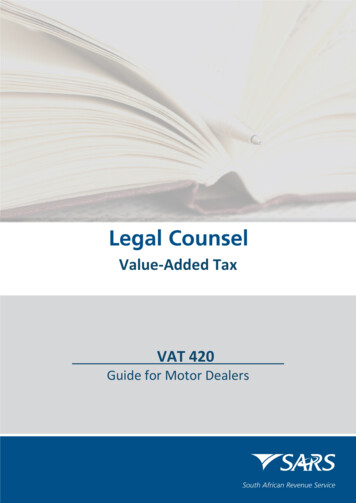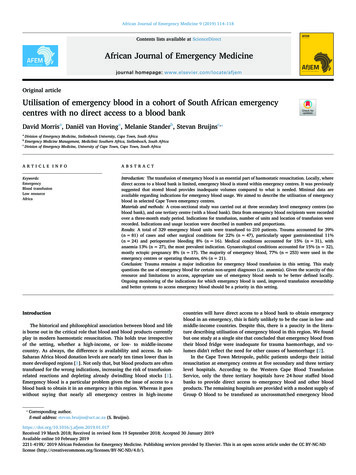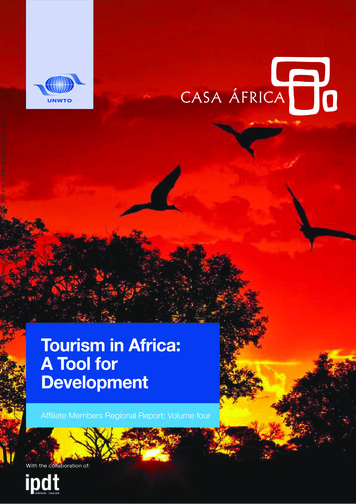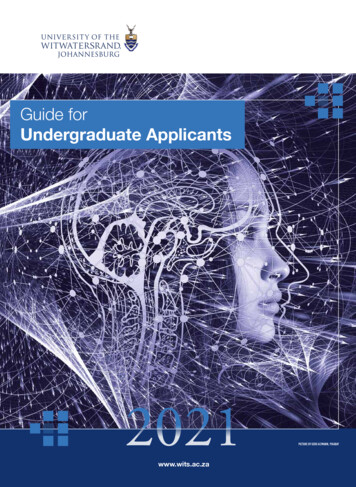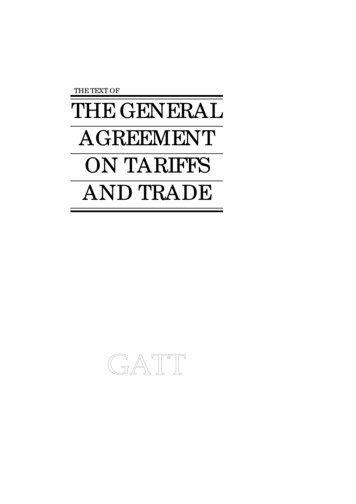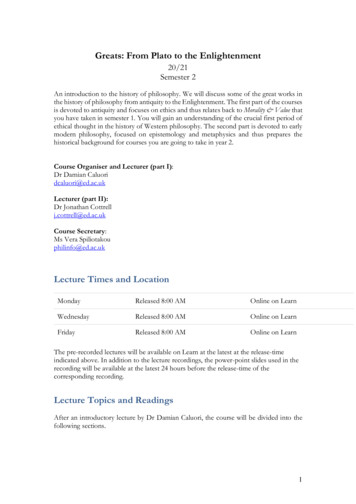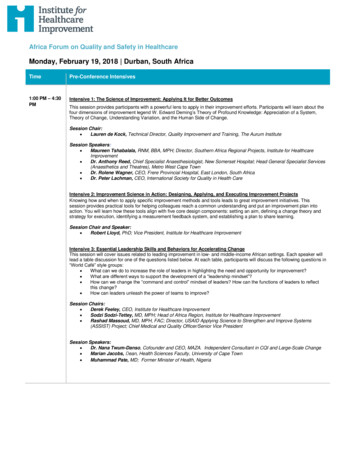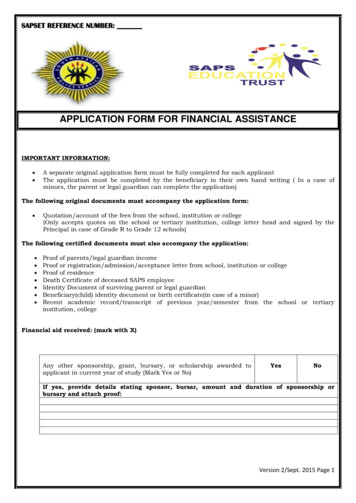
Transcription
REPUBLIC OF SOUTH AFRICAIN THE HIGH COURT OF SOUTH AFRICAGAUTENG LOCAL DIVISION, JOHANNESBURGCASE NO: 2020/26428(1)(2)(3)REPORTABLE: YES/OF INTERESTTO OTHER JUDGES: YES REVISED: YES/NODate: . 10 August 2021In the matter between:DA CRUZ, VICTOR MANUEL ROSAApplicantandBERNARDO, FERNANDO DA SILVARespondentJUDGMENTThis judgment is handed down electronically by circulation to the parties'representatives by email.Delivered:TURNERAJ:
2[1]This judgment addresses two legal questions relating to the in dup/um rule.1.1First, whether the in duplum rule applies to mora interest claimed on aliquidated debt as contemplated in section 1(1) of the Prescribed Rate oflnterest Act, 55 of 1975.1.2Second, whether the in duplum rule can be relied upon to limit the liability of adefendant flowing from a judgment in which the defendant is ordered to payinterest which, when calculated, exceeds the capital amount of the judgment.[2]The current application follows a judgment granted by this Court, per Foulkes-JonesAJ, in which the applicant, as plaintiff, was successful against the respondent. The factsset out below are taken, primarily, from the judgment.[3]Tn late 2007, the applicant entered into negotiations with the respondent to invest in oneor more of the respondent's businesses and concluded a written agreement on 29October 2007. The party with whom the plaintiff was alleged to have contracted wasVando Trust ("the Trust") and pursuant thereto, the applicant made payment ofR903,500.00 into an account in the name of VF Audio Visual Systems CC ("VFAudio"). It appears that the respondent was involved in controlling the affairs of bothVF Audio and the Trust.[4]Soon thereafter, the deal collapsed and on 3 December 2007, the applicant claimedrepayment of his investment. Two amounts, totalling R91 000, were paid in early 2008and when no further payments were made, the applicant instituted action on 27 May2008 to recover the balance of the amount that he had paid. The first defendant in theaction was the Trust and the second defendant was the VF Audio Visual CC. Therespondent was cited as third defendant in his capacity as a trustee of the Trust.
3Subsequently, the other two trustees of the Trust were joined as fourth and fifthdefendants, respectively.There were a number of delays in proceeding with thelitigation and, in late 2015, the respondent was joined to the action in his personalcapacity, as the sixth defendant. The claim pleaded against him was for: breach ofwarranty of authority by him; an order that the Trust was his alter ego; and that theTrust was a sham as it did not comply with the necessary formalities for its formation.[5]Shortly before the trial, the Trust delivered a consent to judgment in terms of rule 31 (1)for the sum of R812,500.00 together with interest thereon and payment of costs of suit.The Trust had no bank account and no funds and so its tender of judgment against itwas, at best, an empty tender. 1 Consequently, the applicant pursued the respondent inhis personal capacity.[6]In the trial before Foulkes-Jones AJ, the applicant asserted that the respondent shouldbe found ''jointly liable with the first defendant (the Vanda Trust) on the basis ofbreach of warranty of authority by him and/or disregarding the trust form (the alterego claim).The plaint/ff also submits that the sixth defendant be held jointly andseverally liable with the first defendant in respect of the latter's consent to judgmentand that the court should pierce the trust veneer and hold the sixth defendantpersonally liable/or the indebtedness of the.first defendant to the plaint(ff. "2[7]After finding that the claim against the respondent had not prescribed3, Foulkes-JonesAJ turned to the claims on the merits. In finding against the respondent, the learnedJudge found and ordered as follows, without any discussion on the liability for orcalculation of interest payable on the capital amount of the debt:1Judgment para 782Judgment para 31. 73Judgment para 73
4"79. In the present matter, the third defendant and for the (sic) matter thefirst defendant, acted outside the scope of its authority to act and in thecurrent matter, it would be manifestly unfair and unjust to visit theresults thereof on the Plaintiff (a third party in the transaction), whobona fide parted with monies raised against his home bond. Heundoubtedly relied on the representations made to him by what heperceived to be a good and trusted friend. The latter sought by hisconduct to mislead not only the Plaintiff but also the Court by makingmisrepresentations which were untrue in his pleadings.80. I find in all the circumstances that the conduct of the sixth defendantwas opportunistic, calculated to evade his obligations to the plaintiffand that accordingly, the plaintiff must succeed on this score in hisclaim that the veil should be pierced. I therefore make the followingorder:80.1 The Third and Sixth Defendants are ordered jointly and severally, theone paying the other to be absolved:80.1.1To make payment to the Plaintiff in the amount ofR818,250.00; [It is common cause that the capital amountstated in the order of R818,250.00 was an error and that thecorrect capital amount is in fact R812,500.00.}80.1.2Interest on the amount a tempore mora from 3 December 2007to date of payment;80.1.3Costs of suit including the costs of the Sixth Defendant'sSpecial Plea."[8]The judgment was delivered on 22 May 2020 and the respondent did not apply forleave to appeal. On 17 July 2020, the applicant's attorneys sent a letter to therespondent's attorney demanding payment of the correct capital amount ofR812,500.00 plus interest in the amount of Rl,590,952.91. The letter also set out theplaintiffs calculation of the interest awarded in terms of the Prescribed Rate of Interest
5Act - 15.5% per annum on a straight-line basis at R345.03 per day calculated from 3December 2007 to the date of the letter.[9]On 30 July 2020, the respondent's attorney replied, disputing the calculation of theinterest amount and contending that the in duplum rule applied to limit the interestpayable by the respondent to R812,500.00. Further correspondence was exchanged inwhich the parties argued their respective positions. Thereafter, the following paymentswere made by the respondents to the applicant: (i) on 5 August 2020, an amount orR812,500.00; (ii) on 18 August 2020 a further payment of R812,500.00.[10] The applicant's notice of motion in the current application claims the following relief:1. An order declaring that the in duplum rule does not apply to themoratory interest awarded in the judgment and order under Case No.15636/2008 in the Gauteng Division of the High Court, Johannesburg,by Her Ladyship Ms Acting Justice Foulkes-Jones ("the judgment").2. An order declaring that the respondent remains indebted to the applicantin the amount of R785,008.56 being the balance due in respect ofmoratory interest awarded in the judgment.3. Interest on the aforesaid amount ofR785,008.56 a tempore mora to dateof final payment, both days inclusive.4. Directing the respondent to pay the applicant's costs of this application.[ 11] The respondent did not deliver an answering affidavit but instead delivered a notice interms of rule 6(5)(d)(iii) identifying what he asserts to be the correct legal position andthe point to be determined, as follows:"The in duplum rule applies to the running of interest on the capital amountawarded in the judgment under Case No. 15636/2008 and that if theapplicant is entitled to claim any additional interest, such interest is to be
6calculated from the date of the judgment to the date of payment of thejudgment debt."[12] The parties are not in dispute in relation to the additional amount of the interest thatwould be payable if interest were to be calculated at the prescribed rate for the fullperiod from 3 December 2007 to date of the judgment. This amount is R785,008.56,being the total interest amount of Rl,597,508.52 less the R812,500.00 already paid.The parties are also not in dispute that the respondent is liable for interest on thejudgment debt (taking into account the two payments ofR812,500.00 made in August2020).[13] Prior to the hearing, I sent a note to the parties identifying specific questions to beaddressed at the hearing of the matter and invited counsel to make written submissionsin advance of the hearing, if they so wished. These points were i. "Does this application require the Court to interpret the judgment andorder of Foulkes-Jones AJ?"ii. Does the relief claimed by either party in the current applicationinvolve a variation of the order (2) granted by Foulkes-Jones AJ? 4 "111.Is this Court functus officio in relation to the third and sixthdefendants' liability to the plaintiff, for interest on the capital sum?"[14] On Monday 8 March, I received the parties' joint submission in response to myenquiries, to the following effect: (i) the parties are ad idem that this application doesnot require the Court to interpret the judgment of Foulkes-Jones AJ; (ii) neither partyseeks a variation of the order granted by Foulkes-Jones AJ; (iii) the parties are ad idemthat the Court is indeed functus officio in relation to the third and sixth defendants'liability to the plaintiff for interest on the capital sum per se. However, while both4Judgment paragraph 80.1.2, quoted above
7parties are ad idem that the Court is functus officio in relation to the liability for interestper se, it is not functus officio in relation to the issue of whether the in duplum ruleapplies to the interest awarded in the judgment.[15] During the hearing, I asked the parties whether the issue raised by them was onecontemplated by the full court in Transvaal Canoe Union, 5 where the parties agree thatthe issue raised is accessory or consequential to the judgment and is one in which theynow agree should be incorporated in the judgment. 6 Mr Kairinos SC, who appeared forthe applicant, confirmed that there was no agreement of this sort and that if I found thatthe Court is functus officio and cannot revisit the question as to whether the in duplumrule should apply to interest awarded in the judgment, then I should make that findingand confirm the respondent's liability of the outstanding balance.[16] I deal with this issue in the second part of this judgment but, as neither party considersthat the Court is functus officio in relation to the issue of whether the in duplum ruleapplies to limit the interest awarded in the judgment, I deal first with the vexed questionof whether the in duplum rule applies to limit mora interest payable on a claim for aliquidated amount.The in du plum rule[17] As this judgment deals with the circumstances in which the in duplum rule shouldapply, it would be useful at the outset to record a clear definition of the rule.[18] In Oneanate, 7 Zulman JA described the rule as follows:5Transvaal Canoe Union v Butgereit and Another 1990 (3) SA 398 (T) at 403E- 404E.6Transvaal Canoe Union supra at 404E.7Standard Bank of South Africa Limited v Onea11ate /11vestme11ts (PM Ltd (in liquidatio11) 1998 (1) SA 811 (SCA) at827H.
8"It provides that interest stops running when the unpaid interest equals theoutstanding capital. When due to payment, interest drops below theoutstanding capital, interest again begins to run until it once again equalsthat amount."[19] Jn Paulsen 8, Madlanga J 9 held 10 :"It provides that arrear interest ceases to accrue once the sum of the unpaidinterest equals the amount of the outstanding capital. .". . . The overarching purpose of the rule is to protect debtors from beingcrushed by the never-ending accumulation of interest on an outstandingdebt. As Tuchten AJ neatly put it in Bellingan" 11'(T]he jurisprudential foundation for the restriction [of interest to theduplum] was the policy consideration that debtors whose affairs aredeclining should not be entirely drained dry . "'[20] In a concurring judgment, Moseneke DCJ 12 held 13 "It is a common-law norm that regulates the accrual of interest on a debtthat is due and payable. The rule is that arrear interest stops accruing whenthe sum of the unpaid interest equals the extent of the outstanding capital. .The plain policy consideration underlying the rule is to prevent a brokendebtor from being pounded by the ever-growing interest burden.Thepurpose of the rule is dual. It permits a creditor to recover double thecapital advanced to the debtor whilst it seeks to alleviate the plight ofdebtors in financial distress."[21] Wallis JA 14 in the earlier SCA judgment in Paulsen 15 had recorded the following:RPaulsen and Ano v Slip Knot Investments 777 (Pty) Ltd 2015 (3) SA 479 (CC).9Jafta J and Nkabinde J concurring.10Paulsen at para 42 - 44uBellingan v Clive Ferreira & Associates CC and others 1998 (4) SA 382 (W) at 399 B-E.12Mokeng CJ, Khampepe J, Leeuw AJ and Van der Westhuizen J concurring.nAt 107 ff14With whom Mpati P, Shongwe JA and Mathopo AJA concurred.
9"Once interest is payable on a debt the in duplum rule potentially comesinto play. The effect of that rule is clear. Where a debt is owed and bearsinterest, the amount of such interest may not exceed the capital amount. Itwas argued that this restriction only applied to arrear interest but, as thecases show, that expression merely means the accumulated interest on theamount in arrears. It excludes amounts already paid by way of interest andrelates only to interest that has accrued but is unpaid." (emphasis added)[22] Paulsen and Oneanate dealt with a loan agreement and an overdraft respectively,agreements to which the rule clearly applies and neither case interrogated the type ofdebts that are covered by the in duplum rule. The focus of both of those cases was onwhether the rule was suspended by the institution of legal proceedings to recover thedebt.[23] In LTA Construction 16 an arbitrator had determined contractual liability of theAdministrator to LTA on two claims and had made an award of interest on the capitalsums determined by him. The arbitrator found that the administrator was liable for: i) acapital sum of R63,080.30 plus interest from the due date 30 July 1991 until 23December 1997 - which, at the bank prime rate provided for in the contract, amountedto R138,593.21; ii) a capital amount of R57,750 plus interest at the contractual ratecalculated from 23 August 1993 which, by December 1997, equated to R63,021.25.The total amount awarded, including capital and interest, was therefore R322,444.76.[24] After the arbitrator had handed down his award, the Administrator did not pay the totalamount awarded but only paid an amount of R241,660.60 being twice the capitalamount awarded (i.e. capital plus interest at in duplum). When the Administratorapplied to Court on a separate issue relating to the contract, LTA brought a counter15Paulsen and Ano v Slip Knot Investments 777 (Pty) Ltd2014 (4) SA 253 (SCA) at para 17.16LTA Construction Bpk v Adminstrateur, Transvaal 1992 (I) SA 473 (A)
application requesting that the arbitrator's award be made an order of Court andjudgment for the unpaid difference. The Administrator resisted the counter-applicationasserting that its liability was limited by the in duplum rule.Only the counterapplication was appealed to the Appellate Division. 17[25] After reviewing the historical development of the in duplum rule from the Roman Law,the Law of the Middle Ages, the Dutch Jurists and the Roman-Dutch Law, Joubert JArecorded the following in relation to the in duplum rule 18 :" Na my oordeel is die renteverbod in duplum (meer korrek ultra sortem),soos dit in die klassieke tydperk van die Romeinse reg ten opsigte van dieoploop en invordering van agterstallige rente tot die bedrag van diekapitaalsom gegeld het, wel in die provinsie Holland en Wes-Frieslandgeresipieer. (emphasis added)[26] The Court confirmed that the rule applied in South Africa and rejected LTA's argumentthat the in duplum rule applied only to loan agreements and not to other agreements. 19Advokaat Burman het ook betoog dat die renteverbod in duplum slegs opgeldlenings betrekking het en daarom nie in die onderhawige gevaltoepaslik is nie. Die partye het met mekaar 'n kontrak vir dietotstandbringing van werke deur LTA Construction Bpk teen vergoedinggesluit. In die algemene voorwaardes van die kontrak is daar voorsieningvir rente op die kontrakprys gemaak. Wat hierdie betoog uit die oog verlooren daarom onaanvaarbaar is, is dat die renteverbod in duplum glad nie totgeldlenings beperk is nie. In beginsel geld dit vir alle kontrakte uit hoofdewaarvan 'n kapitaalsom verskuldi g is wat onderhewig aan 'n bepaalderentekoers is, soos supra aangetoon is. (emphasis added)17The judgment a quo is reported at Administrasie van Transvaal v Oosthuizen en andcr 1990 (3) SA 387 (W).IRfrom 481H19P 482H - 483A.
11[27] Having found that the rule applies to interest on debts arising from all contracts, notonly loan agreements, Joubert JA confirmed the Court a quo was correct in applyingthe rule and limiting the interest recoverable. Importantly, the decision of an arbitratoris not a judgment, but a contractual debt, and so the Court did not see any difficulty inrefusing to enforce the award for the additional interest. 20[28] In Bellingan 21 at p 399B, Tuchten AJ (as he then was) dealt with the in duplum rule asfollows:"The in duplum rule precludes the recovery of accumulated interest to theextent that it exceeds the capital sum. The prohibition on interest in duplumis not limited to money lending transactions. In principle it applies to allcontracts arising from which a capital sum is owed which is subject to aspecific rate of interest. There is no doubt that the prohibition on interest onin duplum applies to unpaid arrear ("agterstallige") interest. 22Mr Harris [for the respondents] submits that the operation of the rule ishowever not restricted to arrear unpaid interest and argues that it applies toevery case in which interest exceeds the capital and remains unpaid.After referring to Stroebel v Stroebel 23, the Learned Judge went on "Mr Harris submitted that these passages were authority for the propositionthat the in duplum rule (as applied in our courts today) prohibited therecovery of unpaid interest in all cases, i.e. whether or not the unpaidinterest was in arrears. I do not agree. Cillie JP was not called upon toconsider this question. Stroebel v Stroebel is therefore no authority forcounsel's contention." (emphasis added)20Administrasie van Transvaal v Oosthuizen en ander 1990 (3) SA 387 (W) at 397121Supra.22LTA Construction Bpk, supra.23Stroebel vStroebel 1973 (2) SA 137 (T) at 138-139.
12[29] After a brief review of the LTA decision and Roman-Dutch authorities, Tuchten AJwent on:"I therefore conclude that under the Roman-Dutch law in force in Hollandand Friesland, the prohibition of interest in duplum was by 1613 limited tounpaid arrear interest and that the jurisprudential foundation for therestriction was the policy consideration that debtors whose affairs aredeclining should not be entirely drained dry while persons who contrive tolook after their interest have no need of such relief. . . A debtor who has stipulated for a lengthy delay between the date of theadvance of the capital sum to him and the date upon which is obliged to paythe capital with interest is in my view even less in need of accommodationthan the debtor who makes periodical payments of interest. There is noreported instance that I have found of to which counsel have referred mewhere the recipient of a long term loan was excused payment of part of theinterest which had accrued on the ground that ultimately such interestexceeded the capital sum."[30] In eThekwini Municipality, 24 the SCA recorded the following at paragraphs 9 and 10:[9] The effect of the in duplum rule is that interest due in respect of a debtceases to run when it reaches the amount of the unpaid capital sum: UnionGovernment v Jordaan's Executor 1916 TPD 411 at 413. The rule is basedon public policy and is meant to protect debtors from exploitation b ycreditors by forcing them to pay unregulated charges, and enforce soundfiscal discipline on creditors. It cannot be waived in advance or during theperiod of the loan: Standard Bank of SA Ltd v Oneanate Investments (Pty)Ltd (In Liquidation) 1998 (1) SA 811 (SCA). It does not relate only tomoney-lending transactions but applies to all contracts where a capitalamount that is subject to interest at a fixed rate is owing: LTA ConstructionBpkv Administrateur, Transvaal 1992 (1) SA 473 (A) at 4821-483A.24eThekwini Municipality v Vendam Medi Centre (Pty) Ltd [2006) 3 All SA 325 (SCA) at para 9.
13[1OJ The scope of application of the rule is succinctly set out in Sanlam LifeInsurance Ltd v South African Breweries Ltd 2000 (2) SA 647 (W) .where Blieden J said at 655D-I:"[T]he in duplum rule is confined to arrear interest and to arrearinterest alone. In my judgment the reason for this is plain: it is toprotect debtors from having to pay more than double the capital owedby them at the date on which the debt is claimed . .Counsel's reliance on the LTA Construction case . for the submissionthat interest does not have to be in arrear for the in duplum rule toapply is, in my view, unfounded. The fact that the capital amount ineach of these cases had either not been ascertained or agreed to at thedate interest started to run does not detract from the fact that theinterest claimed was in fact arrear interest. This is wholly differentfrom the present case, but was to be calculated as future interest in therelevant time period involved."[31] In eThekweni Municipality, the SCA found that the interest which formed part of thedebt owed by the defendant to the plaintiff was "not conventional interest" but rather"the parties unambiguously meant it as a means of formulating a fair and properrestitution for what had been paid and received." As a result, the in duplum rule wasfound not to apply and the full amount claimed (which included interest beyond doublethe capital amount) was payable. l understand the judgment to confirm that the merefact that interest forms part of or is accessory to the amount claimed, is insufficient tojustify the application of the in duplum rule.[32] The case of Margo v Gardiner 25 also provides useful guidance. After the SCAdelivered a final judgment in Gardiner and Another v Margo, 26 the matter went back to25Margo and AntJ v Gardiner and A,w 2010 (6) SA 385 (SCA)26Gardiner and Ano v Margo 2006 (6) SA 33 (SCA).
14the SCA in relation to that Court's original order of interest and the application of the induplum rule. 27[33] Margo, as cessionary, had sued Gardiner for payment of the unpaid proceeds from asale of shares which Gardiner was obliged to sell on behalf of one Joubert (the cedentto Margo). Gardiner disputed his liability but those defences were rejected and theSCA granted an order in favour of Margo ''for payment of the amount of Rl,461,432plus interest thereon at the rate of 15.5% per annum from I September 1998 to date ofpayment. " The judgment was handed down on 28 March 2006, some 7½ years after 1September 1998 and, at the Prescribed Rate of 15 .5% per annum, the total interest wasapproximately 116.25% of the capital sum. Pursuant to the SCA judgment, Gardinermade payment of what he contended was the total amount owing and it appears thatGardiner calculated his total liability at twice the capital sum - applying the in duplumrule to limit his interest liability.Thereafter, Gardiner launched an application for adeclaratory order that the SCA judgment had been satisfied and Margo issued a writ forthe balance and sought an order from the High Court enforcing that writ of execution.Conflicting judgments were handed down by the High Court in the two applicationsand so the matter found its way back to the SCA. 28[34] The SCA disposed of the appeal on two bases:34.1First, relying on Oneanate 29 the Court pointed out that Margo had applied thein duplum rule incorrectly in that he had not taken into account the fact that therule was suspended during litigation. (This judgment was given before thedecision in Oneanate was overruled in Paulsen.)21Margo (supra).2RI have attempted to get access to those two judgments, without success.29Standard Bank v Oneanate (supra).
1534.2Second, as is dealt with more fully in the second part of this judgment below,the Court pointed out that the order for payment of the full interest amoW1tgiven by the SCA was unequivocal, had not been set aside and therefore had tobe given effect to as it stood. 30[35] The following obiter statements were recorded by the Court which are relevant to thecurrent dispute. 31"CoW1sel for Gardiner argued that the difference between this appeal andthe Oneanate case lies in the cause of action. The cause of action howevermakes no difference in the application of the in duplum rule : see LTAConstruction Bpk supra, Bellingan v Clive Ferreira and Associates CC andanother 1998 (4) SA 382 (W); Meyer v Catwalk Investments 354 (Pty) Ltden andere 2004 (6) SA 107 (T).'The prohibition on interest in duplum rule is not limited to moneylending transactions but applies to all contracts arising from a capitalsum owed, which is subject to a specific rate of interest. (MonicaVessio A limit on the limit on interest ? The in duplum rule and thepublic policy backdrop (2006) 39 De Jure 25 at 26-7).[12] lt is trite that the in duplum rule forms part of South African law.It is also axiomatic that the in duplum rule prevents unpaid interestfrom accruing further once it reaches the unpaid capital amount.However, it must be borne in mind that a creditor is not prevented bythe rule from collecting more than double the unpaid capital amount ininterest, provided that he at no time allows the unpaid arrear interest toreach the unpaid capital amount. On the facts of this appeal this com1is not asked to review the order of the SCA but to give effect to it as itstands. The order of the SCA is unequivocal and does not provide forany interest ceiling. Therefore the amounts claimed in the second writare all due and owing by Gardiner to Margo on the strength of the SCA30Margo at para 12 .31Margo from para 11 - 12.
16judgment. The purpose or basis of the in duplum rule is to protectborrowers from exploitation by lenders who permit interest toaccumulate, but essentially also to encourage plaintiffs to issuesummons and claim payment of the debt speedilv . " (emphasis added)[36] The Court went on to acknowledge that when the SCA order was granted, the interestfor the period 1 September 1998 to 27 March 2006 amounted to Rl ,715,360.81 beingan amount clearly more than double the capital amount, and gave no suggestion that thejudgment was wrong. 1 note that, although Shongwe JA states that the "cause of action. makes no difference in the application of the in duplum rule", the cases referred to asauthority for that proposition are all cases involving contracts where the interest rate isstipulated.[37] In Woulidge, 32 a taxpayer had been found to have made a donation when hegratuitously failed to charge interest that would ordinarily have been charged. To limithis tax liability in respect of that interest donation (a gratuitous disposition) thetaxpayer argued that the in duplum rule applied to limit the amount of interest thatwould have been payable to him by the donee. In dealing with whether the in duplumrule was applicable the SCA stated: 33"It is clear that the in duplum rule can be applied in the real world ofcommerce and economic activity only where it serves considerationsobligation public policy in the protection of borrowers a!!ainst exploitationby lenders." (emphasis added)[38] In eThekwini Municipality 34 the SCA clarified that the Woulidge case should "not beunderstood to mean that the identity of the debtor (i.e. whether the debtor requires32Commissioner. South Af rican Ret·e1111e Service ,. Woulidge 2002 (I) SA 68 (SCA) at para 12.33Woulidge at para 12.34At paras 20 and 23 .
17protection from exploitation) determines whether or not the in duplum rule is to beapplied."[39] In Drake Flemmer,35 the SCA was required to address inter alia the interestrecoverable on an unliquidated debt.The facts, though complicated, may besummarised as follows for purposes of the current analysis. The plaintiff had beeninvolved in a motor vehicle accident in July 1997, suffering body and brain injuries.His first attorneys (DFO) negligently settled his claim against the RAF because theyonly claimed for bodily injuries, failing to pick up and claim for the brain injury hesuffered. Having realised the negligence, a second firm (LRI) was briefed to sue DFObut LRI allowed the claim against DFO to prescribe in December 2002. Ultimately,after appointing a third set of attorneys to sue LRI, the matter came to trial in 2015.The liability of LRI was not disputed, the focus of the judgment was on the quantum ofthe claim. The focus of the SCA judgment was on the date to be used to value theplaintiff's claim and how interest should be applied to ensure adequate compensation.[40] The Court determined that the correct date to assess the quantum of the plaintiff's lossin its claim against LRI was December 2002 as that was when LRI had allowed theclaim against DFO to prescribe.The Court recognised however that the value ofmoney in 2015 (and 2017 when the SCA judgment was handed down) was significantlydifferent from its value in December 2002.In doing so, the Court considered itappropriate to employ the provisions of section 2A( 5) of the Prescribed Rate of InterestAct which gives a Court the power to make such order "as appears just in respect ofpayment of interest on an unliquidated debt, the rate at which interest shall accrue andthe date from which interest shall run."35Drake Flemmer and Orsmond Inc and Ano v Gajaar NO 201 8 (3) SA 353 (SCA)
18[41] Alt
republic of south africa in the high court of south africa gauteng local division, johannesburg case no: 2020/26428 (1) reportable: yes/-(2) of interestto other judges: yes (3) revised: yes/no date: . 10 august 2021 in the matter between: da cruz, victor manuel rosa applicant and bernardo, fernando da silva respondent judgment

